1997 – Guyana revisited.
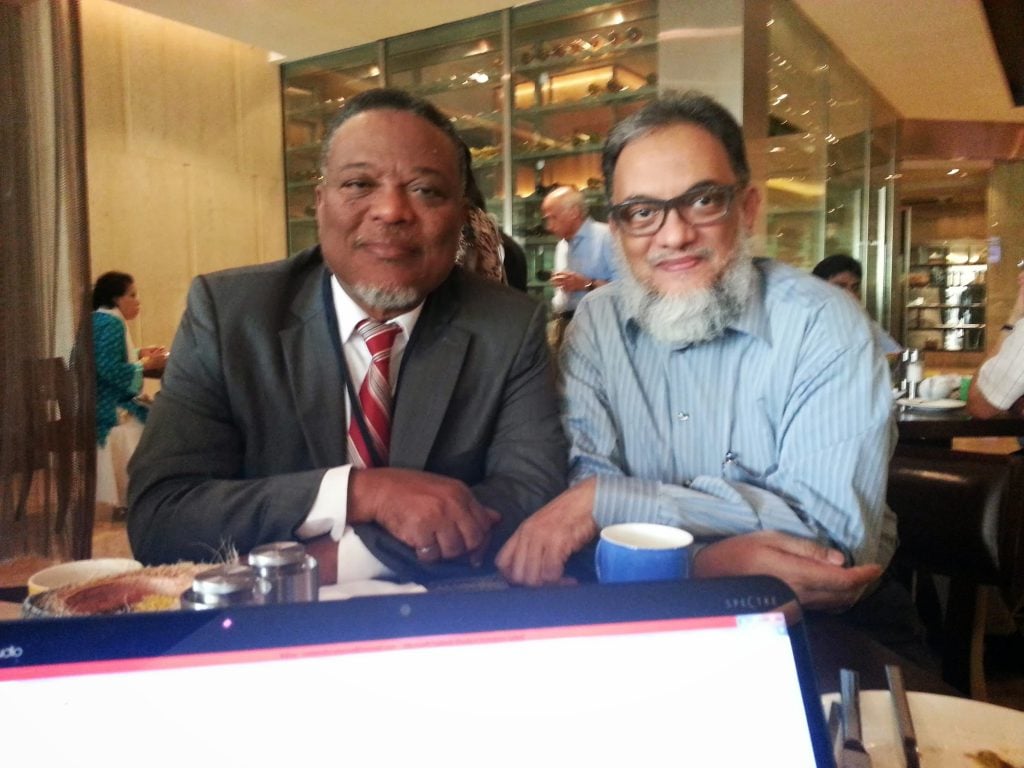
Samuel Archibald Anthony Hinds (born 27 December 1943) is a Guyanese politician who was Prime Minister of Guyana almost continuously from 1992 to 2015. He also briefly served as President of Guyana in 1997. He was awarded Guyana’s highest national award, the Order of Excellence (O.E.) in 2011. Prior to this Sam Hinds worked for Alcan (Guymine’s name prior to nationalization), as head of chemical engineering. By education, Sam Hinds is a licensed and qualified chemical engineer, having graduated from the University of New Brunswick. And Wiki goes on to say, “Sam Hinds is honored in the scientific name of a species of lizard, Kaieteurosaurus hindsi.” Why did I begin with this? Because Sam Hinds was and is my friend. And what’s more, if you ask him, he will confirm this.
The problem with having ‘friends in high places’ is that those friends mostly don’t remember you when they get to those places. My friend the Hon. Samuel Hinds is not one of them. Sam Hinds and I worked in Guymine (Guyana Mining Enterprise), he in Linden and I in Kwakwani. My father was in Linden and was a close friend of Sam and his wife Yvonne and our families became good friends. When my friend Arjun Reddy and I decided to go to Guyana in 1997, Sam, very kindly invited us to come as his guests i.e. as guests of the Prime Minister of Guyana.
Arjun and I landed at the Georgetown (Timehri then, Cheddi Jagan International now) airport, famous for its long snaking queues and immigration in slow motion. But we loed and beheld that a uniformed officer was looking for us holding up a neat sign with my name. I went up to him and introduced myself and exactly three minutes later we were getting into the Prime Minister’s car outside the airport. Having friends in high places helps you at least to beat the immigration lines. We had booked into the Pegasus hotel, which bills itself as, “Pegasus Hotel is the premier international Hotel in Guyana, which is located on the delta of the Demerara River and Atlantic Coast, at the center of Georgetown’s business and diplomatic district.” But Sam insisted that I stay with him. That is Sam for you. A man, unlike others, who does not forget his friends when he reaches high places. Sam came to India in 2010 on a State visit. His secretary called me in Hyderabad and said, “The Prime Minister wants to meet you. He was planning to visit you in Hyderabad, but some unexpected meetings have come up in Delhi. So, is it possible for you to go to Delhi to meet him?” Of course, it was possible and an honor and so I did. We had breakfast together and took the photo which is at the head of this post.
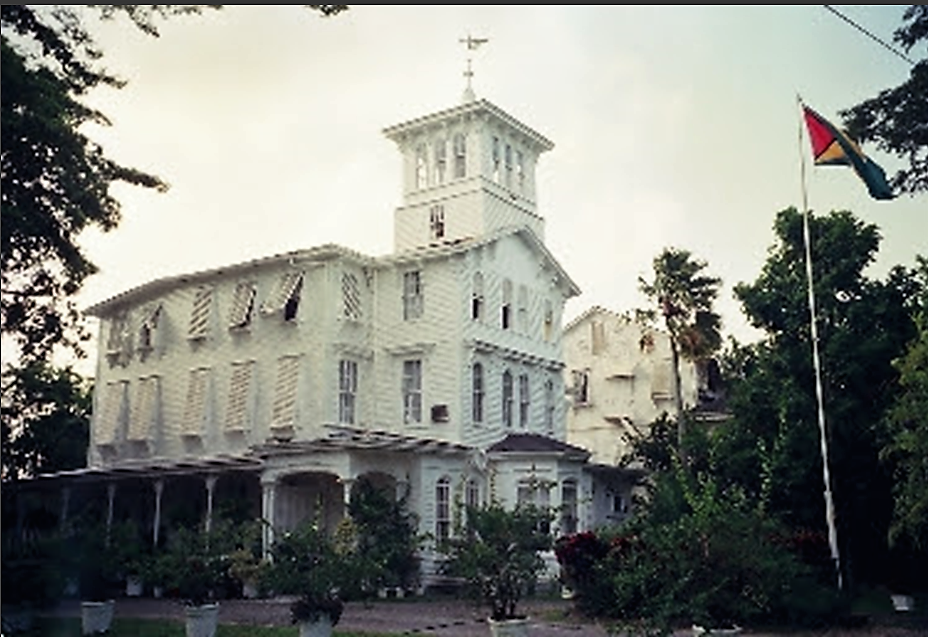
In 1997, I stayed with Sam and Yvonne Hinds, in the Prime Ministerial Residence, a delightful old British colonial bungalow, made entirely of wood, surrounded by a garden with lovely old trees festooned with ferns, philodendrons and hanging moss. Arjun stayed at the Pegasus, which looks out over the mud flats leading to the sea. Guyana has no beaches. Only mud flats which are treacherous for the unwary who may walk out onto it thinking that it will support their weight. It won’t. To sink slowly in the mud until it closes over your head is not a nice way to leave this world.
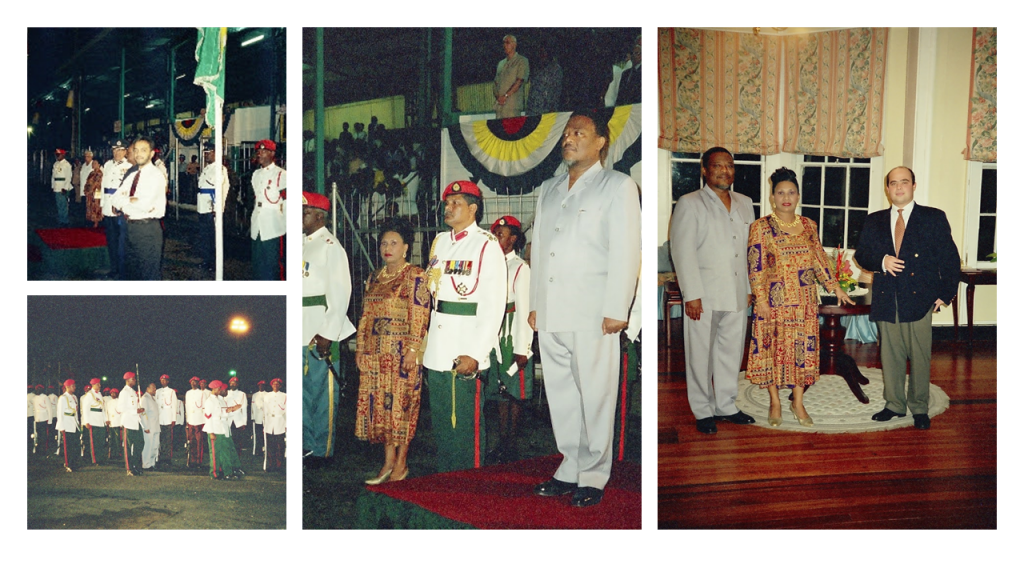
It so happened that the day after we landed was Guyana’s Independence Day and in true Guyanese style, since they got independence at midnight the celebration was also to be at midnight. Since we were the guests of the Prime Minister, we were special invitees to the parade which would be at midnight. There was much excitement in the house as Sam’s children got ready for the big event. I had had no idea that I was going to be the guest of the Prime Minister at the Independence Day parade and so had not brought any formal clothes. I did the best I could in a white shirt and tie. Arjun was better prepared as he had a smart navy blazer. We left the house at about half past eleven and drove to the Georgetown stadium. Sam inspected the Guard of Honor while we sat in the gaily decked tents and watched. Then came the turn of the Guyana Fire Service. This consisted of one spanking new fire engine, gifted to the people of Guyana by none less than Her Britannic Majesty the Queen. It was quite literally in a ‘gift wrapped’ state and had been highly polished for the occasion and shone like a jewel in the British crown. This was driven sedately around the entire stadium with its siren blaring and the bell tolling so that everyone could testify that the impressive machine was in good working order. The fire engine stopped opposite the Prime Minister’s podium and it was announced, “The only lady member of the Guyana Fire Service will give a demonstration.”
The young lady was hoisted into the seat on the ladder and at the press of a button, she rose skywards at great speed. It was then I realized that she was holding a hose. I wondered why but was not left in suspense too long. As soon as the ladder reached its maximum extension which was very impressively tall, someone turned a wheel and the young lady proceeded to unleash a flood of biblical proportions on the ground right in front of the Prime Minister’s seat. People ran for cover. Someone tried to tell her to stop but either she had no control over the thing or wanted to get her own back on the ones who had hoisted her, so unceremoniously into the air. It was only when the last drop of water was gone, that the hose fell silent. As a way to wake up everyone in the middle of the night, there is much to be said in favor of deluging them with copious quantities of cold water. I can assure you that nothing comes even close to this remedy.
Then came the march past of the Guyana Armed Forces and Police who squished as they marched past the PM’s podium. But in the happiness of the day, nobody really cared that they had to splash through puddles. We were then treated to a wonderful midnight feast and returned home in the early hours of the morning.
Guyana of 1997 was different from the Guyana of 1979 which I knew. Much poorer. Less industry. More unemployment. A lot of the youth had left for the USA. There are probably more Guyanese in the US, Canada, and the UK than there are in Guyana. A very depressed economy and not much of a chance of changing, principally as there is almost nothing there that anyone wants. Does not seem like such a bad thing when you compare with places where there are things that people want, like Iraq for example. Better to be left alone in peace in today’s world I believe. But as I write this today in 2021, oil has been discovered in Guyana and so it is a different world. I would love to visit again to see what has changed thanks to this.
Talking of 1997, the challenges of earning a living and raising a family in a depressed economy produced its usual effects. So, there was a fairly high level of social unrest. People who had become used to relying on and being dictated to by a socialist government for two decades, found it difficult to take charge of their lives and do something useful for themselves now that the new government had given them freedom. Truly, freedom is a difficult thing to accept. Slavery is so much easier and comfortable. And safe. Easier to complain than to work to change your life. Easier to blame others than to look at yourself in the mirror.
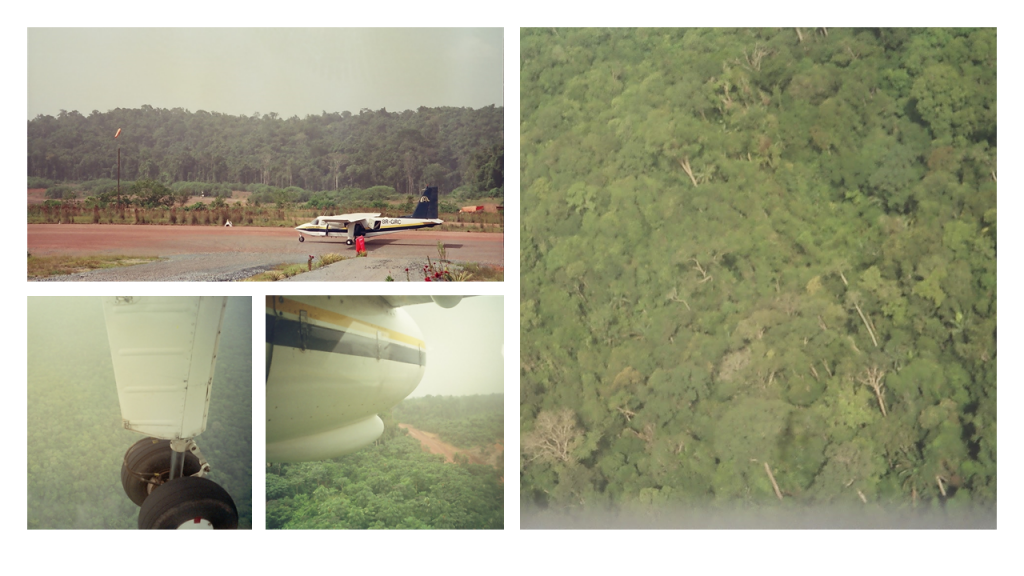
Sam was very kind and suggested that Arjun and I visit the gold mine in Essequibo. I was very keen because Essequibo and Rupununi were the two places that I had not been able to visit when I lived in Guyana. Still must go to Rupununi and Kaieteur Falls, but Essequibo can be ticked off on my bucket list. So off we went the next morning in a Cessna, flying over the rainforest, an endless sea of green below us. I love flying in small planes as you are close to the ground and can see what you are flying over. In Essequibo we were welcomed by one of the managers of the gold mine who guided us through the mining operation and purification process, and gave us a lovely lunch after which we returned to Georgetown the same evening. And the biscuits with our tea where not made of gold. Hmm!! Not that I would have complained, had they been. Well, one can dream, right?
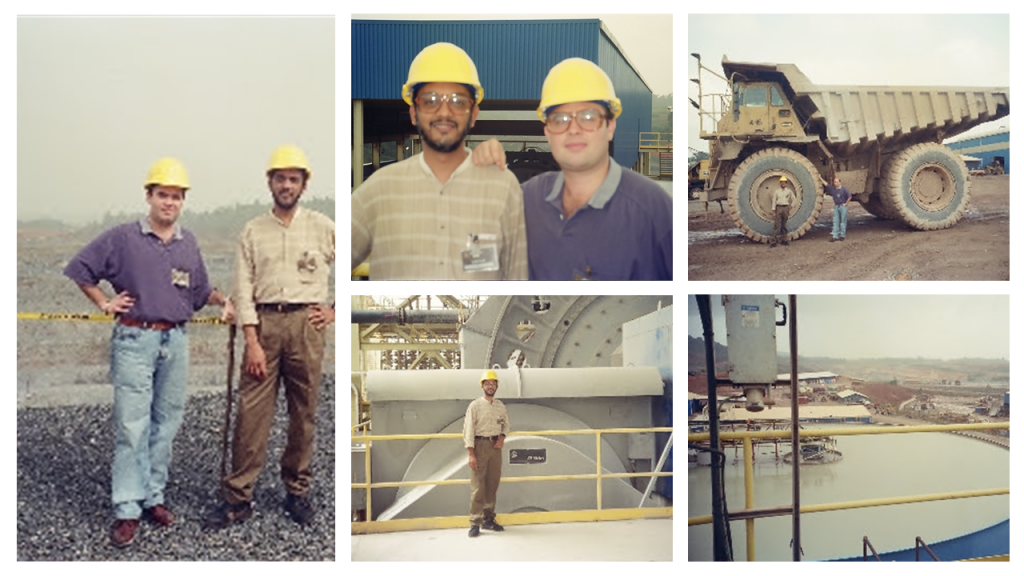
Of course, I had to visit my old home in Kwakwani. Kwakwani is Guyana for me. And so, one morning Sam’s driver took Arjun and me in a Mitsubishi SUV, a far cry from the Kwakwani bus which I used to travel on or the beaten-up old Land Rover I sometimes drove in, to Georgetown. We stopped in Linden and picked up my dear friend, mentor and first boss in Guyana, James Nicholas (Nick) Adams. Nick was from Linden and had retired there where he had his own house. Eventually he would migrate to Brooklyn in the US and we would meet there once again. On that day Nick was ready and after we’d had a cup of tea with Kathleen and him, we left to meet another common dear friend, Walter Melville (Wally) and his charming wife Pauline. Wally had retired but they lived in the same house that they had lived in when he was Coordinator (Vice President) Human Resources at Guymine. At that time, Wally was Nick’s boss and my super-boss, but always was and remains a dear friend first. The house was built of wood on stilts like all the houses in Watooka, the Senior Officer’s colony in Linden. This created a lovely huge parking and workspace below the house with the entire house elevated and in the way of whatever breeze may be blowing. Given that the days are usually still and hot, this was most welcome. The house itself was almost totally open, with huge floor to ceiling wrap-around windows covered with mosquito mesh. It had a huge overhanging roof which kept out the rain and let in the breeze. In case of a storm, the window shutters would be closed but even these had louvers so that the breeze always played in the house. Though Guyana is tropical, when we lived there, air conditioning was almost unknown and unnecessary. The breeze blowing over the water of the Demarara was better than any air conditioning.
When architecture takes into account local conditions, be they topographic or climatic or social, it becomes a source of great delight and comfort. When on the other hand, as happens in our cities in India, where RCC (reinforced cement concrete) is used for everything from bus shelters to shopping malls we have the style that adds no value, is environmentally and climatically disastrous and looks ugly to boot.
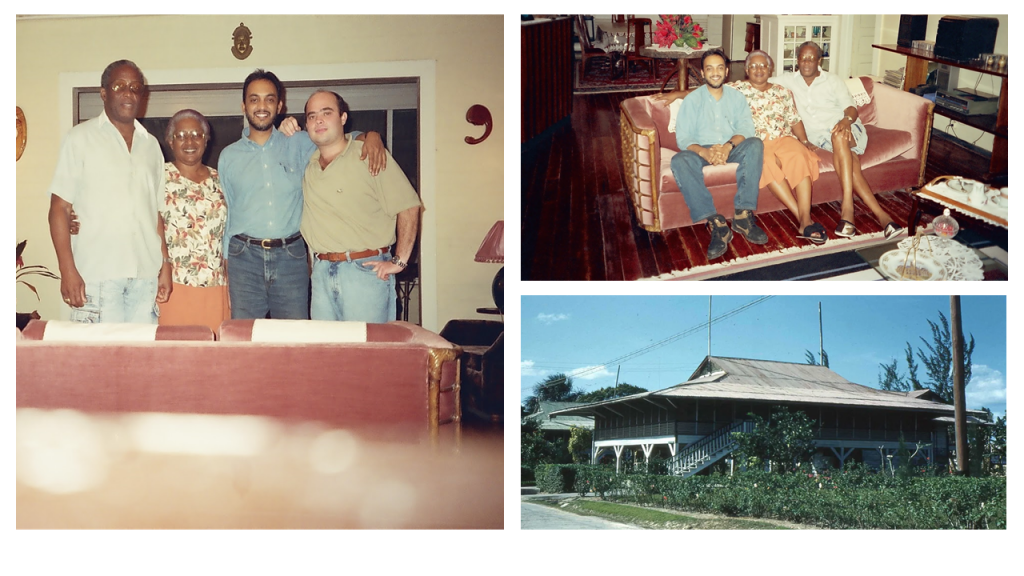
All the houses in Watooka overlooked the Demarara River. Like all the big rivers of Guyana this is deep and wide and apparently still. It does have a strong current driven by the tides, which flows deep but is not visible at the surface. The riverbank is thickly wooded with lush green vegetation coming right down to the edge of the water with the roots of many trees, literally in the water. These leech chemicals into the water which makes it the color of coffee, but it has no taste and is good to drink. To sit on the veranda which runs all around the house and watch the river and the occasional boatman on it, is the most peaceful activity that you can imagine.
We spoke of old friends, of times gone by. We spoke of the future of Guyana as we saw it. We spoke of all that needs to be done to change the situation that existed for the better. I believe that each generation is given the opportunity to change the world it lives in. Some think about it. Some strategize. Others rise to the challenge. And yet others do nothing, too busy in the mundane transactional goings-on of their own lives. Wally is among those who thinks and tries to do what he can to leave behind a legacy that he can be proud of. I wish him all the best. He had been an inspiration for me when he was my super-boss and I was a young manager. I was delighted to see that the years had treated him well and that he was as dignified and lovable as he was worthy of respect.
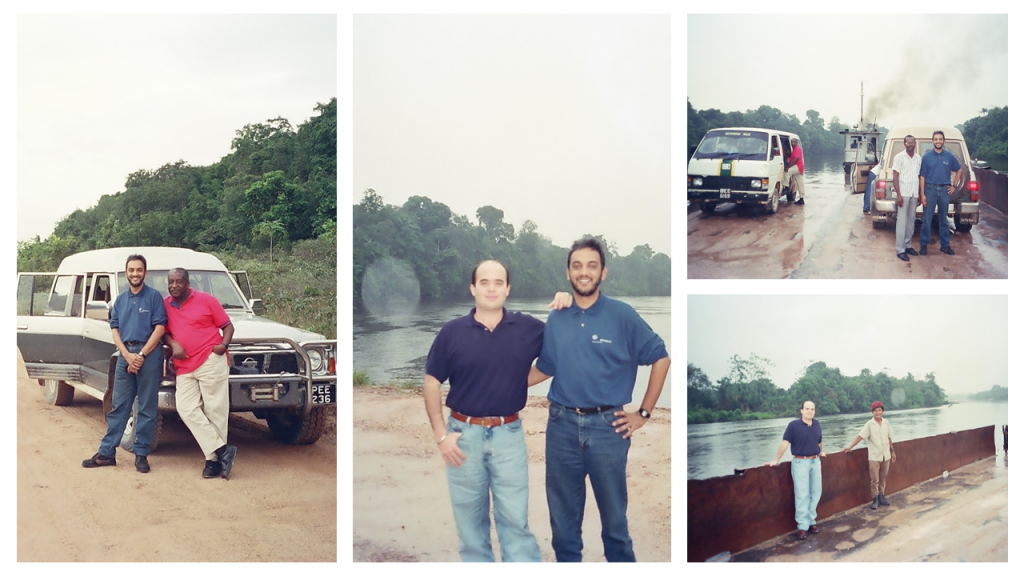
We took their leave and left for Kwakwani to reach before it got too dark. I wanted to see what the Kwakwani river crossing was like after all these years. We arrived at the end of the Kwakwani Trail, as the road was called, and it ended literally in the Berbice River. As in the old days, there wasn’t even a barrier to prevent someone from simply driving into the river. Given the tendency of Kwakwani people to drink, it is a wonder that nobody, to the best of my knowledge, ever did. We reached there in the early evening and honked a few times to attract the attention of the tug boatman on the Kwakwani Waterfront. The Administration in Kwakwani had been alerted by radio about the Prime Minister’s guests who were coming so they were looking out for us.
I reflected that there was a time when I would have been the person they would have called if the Prime Minister of the time wanted to send someone as his guest. Today Arjun and I were the guests. We were booked to stay in the Staff Club on Staff Hill, which was adjacent to my old house and I was very excited. The tug boatman was expecting us and sounded his horn to let us know that he was on his way. As we watched, the barge with the tug behind it swung into the stream on its way to pick us up. It reached us in a few minutes and docked at the bank. This consists of simply driving the barge into the bank. The boatman then lets down the ramp and cars can then drive onto the barge. Standing on the side of the barge with the tug pushing the barge back up the river to Kwakwani Waterfront, the wind in my face, brought back so many memories.
I realized when I reached Kwakwani that some things have changed forever. And yet others are still the same. Norman Lindie and all the rest of the guys were not in Kwakwani anymore, but they worked in a mine operated by Greens, the same Americans who had been thrown out unceremoniously during nationalization and replaced overnight by local Guyanese people. However, the communist utopian society did not turn out to be what it was supposed to be because people are people and their needs, egos, ambitions, prejudices, insecurities, and aspirations all come before ideology. Ideologies that do not take human nature into account are destined to fail, no matter how utopian they may appear to be in theory. Fifteen years later, after running the company into the ground and ruining the economy, the political bosses learnt the lesson the hard way…competence is not a race or a nationality thing. It is not even a political thing. And it has nothing to do with patriotism. Competence is a knowledge thing. If you throw out people who know how to run things, without making the effort to learn from them, then things won’t run just because you have a local guy running them. So, the government was forced to ‘invite’ Greens to come back. Which of course, they gladly did. On their own terms. A very humiliating and expensive bargain.
The Kwakwani I had known and loved is gone. Maybe forever. The school no longer has any children in it. The Kwakwani Worker’s Club in Kwakwani Park, with its strong aroma of beer and sweat and the deafening noise of people playing dominoes passionately, slamming them on the tables with great force and shouting their feelings; is silent. Staff Hill, the exclusive compound where the Management used to live and where I had my first house, next to the Staff Club, looked like a ruin. Most of the houses, made of wood like almost all the housing at the time in Guyana, were in ruins. Some with the roofs caved in. Nobody cared or had the money to repair them. The orange orchard facing my home, was there only in memory. The last of the trees was long gone, prey to termites, leaf cutting ants and disease. Since then, I am given to understand that things have changed for the better again. Kwakwani Worker’s Club has been resurrected and there is some life back in Kwakwani. I have not been there since and so can’t tell you how much life, but as I said, Kwakwani was my first home and I wish them all the very best.
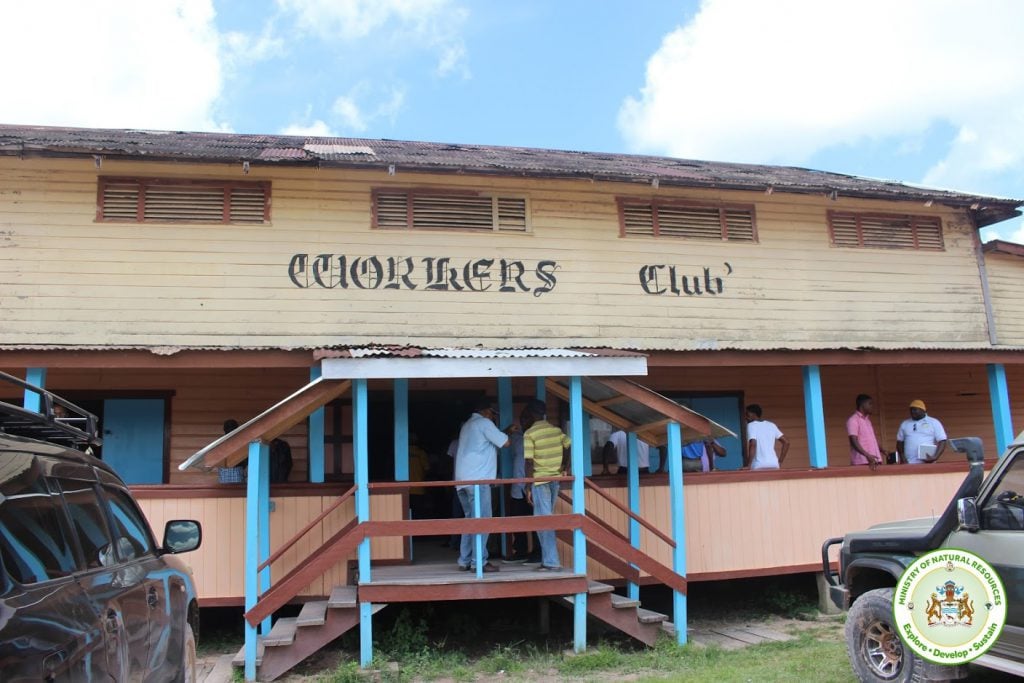
But some things were the same in 1997 as they had been in 1979. The booming call of the Howler monkeys; the conversations of the Macaws as they fly in pairs high above the rain forest, the cicadas and their many cousins, all making different chirps, buzzes and clicks. And the nature of the people of Kwakwani. The same friendship, open house hospitality, concern, and affection. All the same. May they remain the same forever.
I walked down the hill to the stream at the foot of Staff Hill on the other side from which we used to draw our drinking water. It was a small perennial stream that meandered through the forest, talking constantly to itself in gurgling tones, very soothing on a hot afternoon for someone sitting beside it, lost in the dream space between contemplation and genuine slumber. Reality becomes veiled and fantasy becomes real and one can hear the words of the unseen in the voice of the stream. From the stream, if you turned right, began a path that many miles later opened out into one of the mines. I used to walk down that path in the afternoon, every bend promising a new sight, a new excitement. Orchids growing on tree trunks with the most glorious flowers and Hummingbirds in search of nectar with nobody to acknowledge them except their Creator and a lone young man who came looking for them to admire their beauty. In those days when I reached the road, many miles later, I would wait for one of the huge Caterpillar trucks coming out of the mine with 50 tons of ore and hitch a ride. The stream was still there. But the mines had been abandoned and the trucks no longer ran on that road, so I just watched the path going away into the bush, beckoning me for old time’s sake. I walked on it for a while to honor that invitation but didn’t follow it to its end.
That evening in Kwakwani, I went looking for some of the people I used to know. It had gotten dark by the time I reached the Self-Help Colony (the owners built these homes themselves with material that the company, Guymine, provided). I stopped by the gate of one house, where a friend from the old days, Reece, lived.
I clapped my hands, and someone called from inside the house, “Who der man!!” I replied, “Is Ms. Reece home?” “Man! Yawar!! When did you get ere?” says the lady.
I couldn’t believe my ears. Here was this lady recognizing my voice at the first instance after fifteen years. We both laughed at this and remembered old times and old friends. Then she said something that sums up Guyana and Guyanese for me. She said, “We don’t forget a-we friens, man!”
Neither do I. I will remember these wonderful people all my life. Linden Conway, a father figure who could teach the best of us today the meaning of service. Peter Ramsingh, my friend through thick and thin. Nick Adams, my first boss and teacher in the ways of corporate life, human relations, friendship, and investing in people. Lessons I have never forgotten. Naomi, my housekeeper, cook, caretaker, who used to cook fabulous meals and sit opposite me to make sure I ate them. Norman Lindie and his son Andy, my hunting and fishing companions, who I already mentioned and mention again as it is good to remember those who shared their lives with you. Many more. I don’t mention them not because I have forgotten them. I will never forget any of them all my life. I don’t mention them because I know that they know that I remember them. And I love them all very much.
Naomi, Nick, Arnold Shultz, Linden Conway, Peter Ramsigh, Chinee – Morris Mitchell, Uncle Monah have all passed away. But the memory of the times we spent, the joys and challenges we faced together, remain with me, ever alive and vibrant. Sam and Yvonne Hinds, Uncle Wally Melville and Auntie Pauline, and their children, my brother Terry Melville and sister Titia (Heather) Bozimo-Aligbe, Nurse Liverpool, Norman Lindie and his son, my friend and brother Andy, Rev. Canon Thurston Riehl, David and Miriam Ramse are all alive and well and I am in touch with them. Beautiful people who opened their hearts and homes to a stranger from India. As I grow older, I hear about more and more of my friends leaving and I know that my time is also approaching. I hope when I die, it will be with honor and that my friends will remember me with affection and good memories.
In Guyana I learnt how to deal with loneliness, with death, with friendship. I learnt the power of expressing thanks and appreciation to people so that they know you value them and don’t have to wait for you to tell them in their eulogy when they can’t hear you. I learnt to let go the pain of parting but to live with the pleasure of having had them in my life. I learnt to not allow the parting to sadden my heart but to accept that the pain is an indication of a beautiful relationship. The more we give in a relationship the more valuable and rewarding it becomes. But the greater the pain on parting, which is inevitable. But then, what is the alternative? A bad relationship with nothing shared, nothing gained, nothing to regret? I will choose the pain of parting any day over the pain of living in a bad relationship.
How long before it is my turn? Then what will be said about what I left behind? Will there be something worthwhile, a legacy of honor? Will someone cry when I die? Someone other than my immediate family? Or will it be like Methuselah in the Bible, who lived for 950 years and all that they could say about him was that he died.
This thought is constantly in my mind, that our lives must be lived purposefully to leave behind a legacy of honor. Not mechanically like animals, sensation to sensation, breath to breath until one day we stop breathing. To live is not simply to draw breath. I believe it is essential to live thoughtfully, and to take responsibility for both our actions and words. Living thoughtfully is living responsibly. Leaving a legacy is not about showing others. It is about justifying to yourself that you returned something for what you consumed during your life. What was that return? Was it a good return on the investment that all those who encountered you, made in you? The self-made man is a myth. We are the products of our times, situations, families, companions, conditions, and the willingness of others to invest in us. To invest in someone who effectively could be of no use to them personally. Yet they invested, simply because they cared enough about us to want goodness for us. That is why I do not believe the repayment is possible. You cannot repay anyone for the simple reason that when they invested in you, they expected nothing in return. You are at best paying back for what you have already received. That is why gratitude is so important. Gratitude to Allah and to all those who held your hand. It is true that you owe your success to your efforts, but it is also good to remember that some of those efforts were made standing on someone else’s shoulders. If they had not offered their shoulders, you would still be crawling in the dust. It is good to ask yourself from time to time, ‘Did they make a good investment?’ I hope that those who invested in my growth would have been happy to see me today.
I remind myself of this whenever I think of all the wonderful friends, I had who passed away. My heart aches for them all. But then we all must go one day. It is what we leave behind that is important.
The operative question is: What do I want to be remembered for?
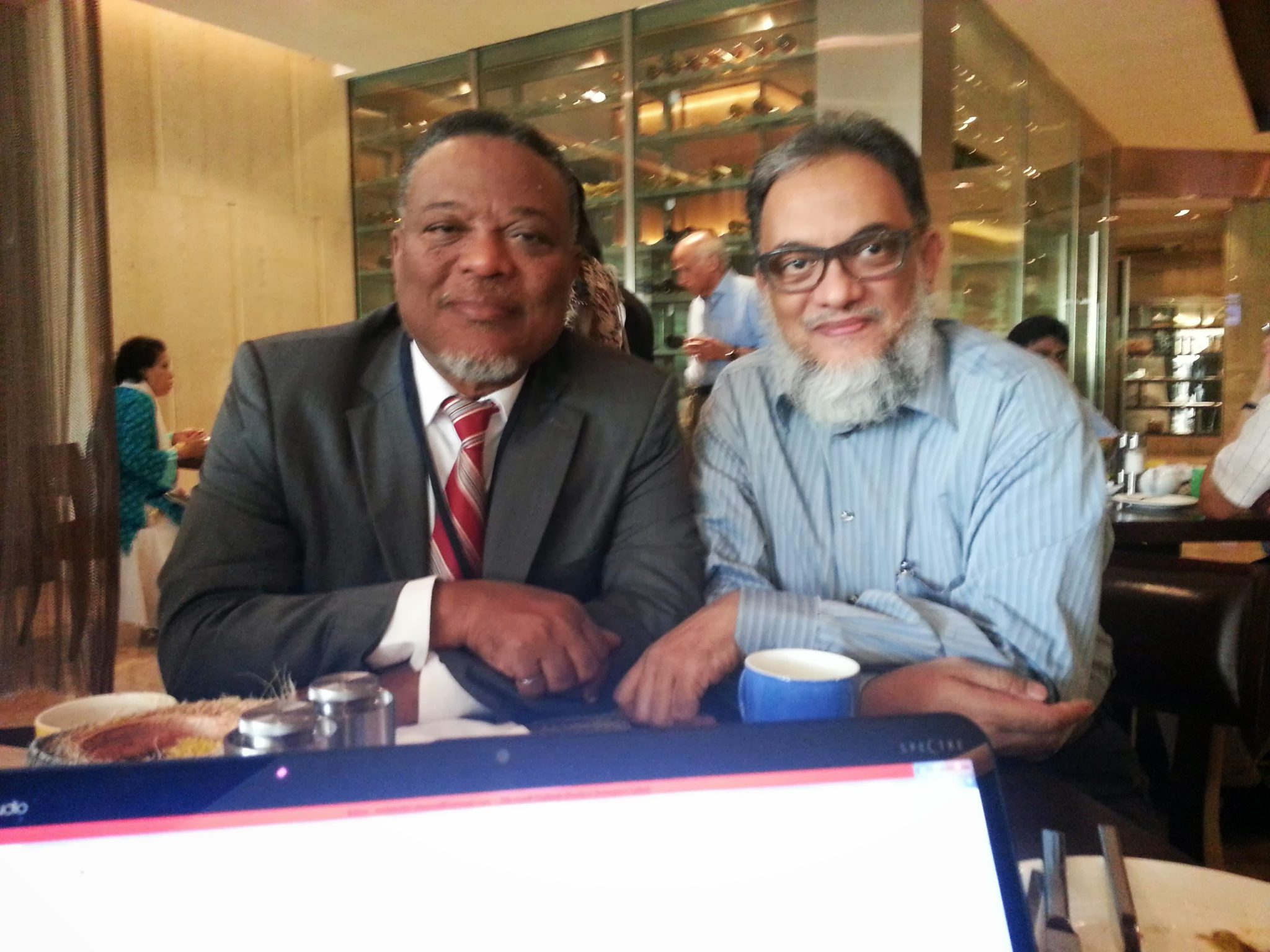
Thanks, Mr Baig…glad it was a happy return to t1he place which had left you with so many friends and wonderful memories.